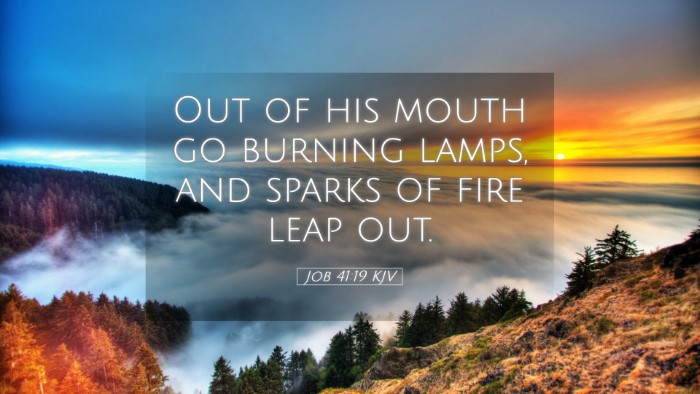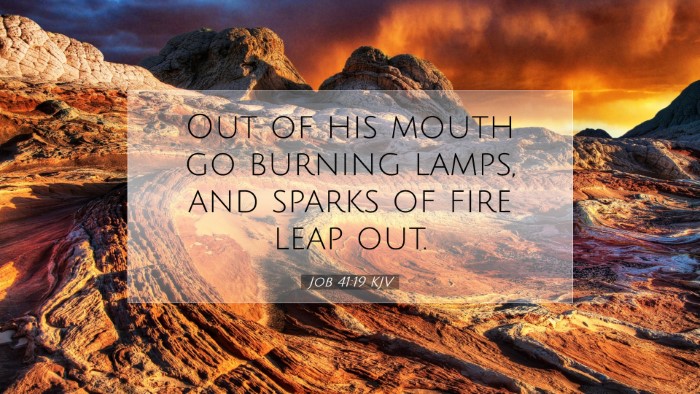Commentary on Job 41:19
The verse Job 41:19 reads: "Out of his mouth go burning lamps, and sparks of fire leap out." This imagery is rich and multifaceted, representing profound theological insights into the nature of God and His creation, specifically through the lens of the creature described in this chapter, often understood to be the Leviathan.
Contextual Overview
The Book of Job is a profound exploration of suffering, divine justice, and the relationship between humanity and God. In the context of Job 41, we see God answering Job out of the whirlwind, emphasizing His sovereignty through the description of the Leviathan, a magnificent and terrifying creature symbolizing chaos and untamable aspects of creation.
Exegesis of Job 41:19
The phrase "Out of his mouth go burning lamps" conveys imagery of fierce, almost uncontainable power. This can be interpreted on multiple levels:
- Symbol of Destruction: The "burning lamps" indicate that the creature is capable of destruction, which may reflect God's power over chaos and evil.
- Illumination: The light from the lamps can also signify enlightenment and divine truth emerging from the creature, illustrating a paradox where something feared also contains elements that reveal God's nature.
- Power of Speech: The mention of "mouth" may suggest the power of the spoken word, which has biblical resonance. God's words bring forth creation and order from chaos, paralleled by the ferocity and strength inherent in the Leviathan.
- Sparks of Fire: "Sparks of fire leap out" further emphasizes uncontrollable energy and danger, reminiscent of divine judgment or the purifying aspects of fire, which often represents trial and transformation in biblical literature.
Theological Implications
The characteristics of the Leviathan as described in this chapter speak to the dual nature of God’s creation. Reflecting insights from Matthew Henry, we can conclude:
- Acknowledge God’s unparalleled power in creation; He controls the uncontrollable.
- Understand our place as humans in the grand narrative, where we are small compared to the vastness of creation and the Creator.
- Recognize that God, while hidden in His sovereignty, is also actively revealing Himself through both the magnificent and the terrifying aspects of nature.
Insights from Traditional Commentaries
Matthew Henry
Henry articulates that the description of the Leviathan serves as a reminder of God’s omnipotence. By illustrating such a being, God showcases the limitations of human strength and understanding, leading us to depend on divine wisdom rather than our own.
Albert Barnes
Barnes observes that the Leviathan may symbolize the chaotic forces within creation that God has dominion over. The verse emphasizes God as the Supreme Being who commands everything, serving both as a warning of His majestic power and an assurance of His ultimate authority.
Adam Clarke
Adam Clarke elaborates on the poetic nature of the language. He suggests that these metaphors are not only to be read literally but understood within the context of their spiritual significance, whereby fire often represents trials or testing—something users of this text might reflect upon in their own lives.
Applications for Pastors and Theologians
This verse can serve as a profound teaching tool for leaders in the church. It invites reflection upon:
- The Nature of God: Understanding the balance between God's gentleness and sovereignty through His creative works.
- Human Limitation: Acknowledging our limited understanding of suffering and the divine plan, leading to deeper spiritual humility.
- The Fear of God: Teaching the congregation the importance of reverence and awe for God’s power, as well as an understanding of His purposes in creation and chaos.
- Encouragement in Trials: When faced with chaos in personal lives, believers can find solace in knowing that God reigns over all, using even the most fearsome things for His glory and purposes.
Conclusion
In Job 41:19, we witness the majestic and terrifying aspects of creation encapsulated in the metaphor of the Leviathan. This passage serves as a crucial reminder of the power and sovereignty of God over all things. As we study and reflect upon this verse, let it inspire awe and respect for the Creator and lead us to deeper trust in His wisdom amidst the mysteries of life and suffering. The commentaries of Matthew Henry, Albert Barnes, and Adam Clarke provide invaluable insights that can enrich the understanding of clergy, students, and scholars alike, facilitating an informed appreciation of this complex theological theme.


